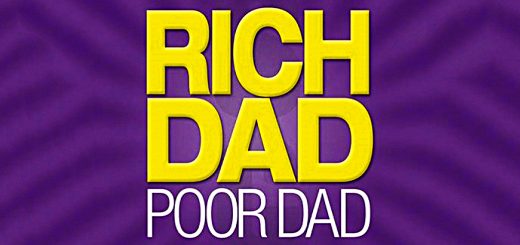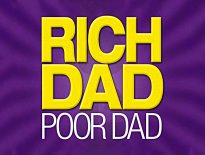Rich Dad Poor Dad 2 – Business and Taxes

Today’s post is our second visit to Robert Kiyosaki’s Rich Dad Poor Dad.
Businesses
Chapter 3 is about businesses and their assets.
Robert begins with a story about Ray Kroc, who said that McDonald’s was in their real estate business, not hamburgers.
- Apparently, Mickie D’s own more land than the Catholic church.
Robert is not a fan of people working for other people – they should work for themselves.
Of course, he does offer a risk warning:
I don’t encourage anyone to start a company unless they really want to.
The odds are against success: Nine out of ten companies fail in five years. Of those that survive the first five years, nine out of every ten of those eventually fail as well.
So only if you really have the desire to own your own company do I recommend it.
Working for yourself is a nice idea, and it’s certainly got a better hit rate for riches than a salaried job, but it’s not for everyone.
With few exceptions, you can’t just work for yourself, you have to get other people to work for you.
- Which is a whole other set of hassles from the regular office woes.
I know I couldn’t do it.
- I much preferred to invest my way to financial independence, and I’m here to tell to that way works too.
As with the previous chapter, the key point is to amass assets, rather than focusing on income.
- I can agree with that part.
Once a dollar goes into it, never let it come out. Once a dollar goes into your asset column, it becomes your employee.
Robert’s list of assets remains stocks, bonds, real estate and IP.
- I include lots of other things, too.
Robert is not a fan of net worth, because he says that if you try to sell your assets, you will be taxed.
While there’s an element of truth to that, here in the UK, you can use your home, SIPP and ISAs to shelter a great deal of money, and draw £66K from your pension each year whilst paying only £7.5K in tax.
- So you could have a comfortable net worth of, say, £3M and only be expecting to pay £150K (5%) in tax.
Robert makes a good secondary point that personal assets (cars, jewellery and other “stuff”) can never be sold for what you might think itis worth.
- But for most people who are serious about financial independence, these items will only be a tiny fraction of their net worth.
Taxes
Chapter four is about taxes.
Robert points out that income tax used to be a temporary thing, to fund wars.
- It was only made permanent in England in 1874, and not until 1913 in the US.
And even then, it used to only apply to the rich.
- That’s how they sold the concept to the majority of the population.
Robert explains that in the public sector, empire building is seen as a good thing, whereas in the private sector, keeping costs down is seen as a good thing.
So over the decades, the size of the state has grown, and taxes have been increased to fund it.
- And now the middle class pay for the poor.
There’s quite a lot of Robert’s personal story here, which I will summarise as:
- Top photocopier salesman gets into real estate, catches the boom in Hawaii and buys himself a Porsche.
Corporations
Robert says that the rich use corporations to pay less tax.
I have operated a limited company here in the UK for several decades, and I have to say that the tax advantages are greatly exaggerated by those who don’t have companies.
- Even if companies did have significant advantages, at some point the money has to come out and be spent by a real person, who will be taxed as normal.
You do gain some flexibility in the timing of cash flows, but there are no real loopholes that aren’t available to regular employees and employers.
- The main advantage of running your own company is that you are negotiating with yourself when it comes to setting the optimum levels for things like wages, dividends, purchases and training.
Robert thinks that being able to spend on expenses before paying taxes is a big advantage for a corporation, but I’d like to know what expenses he has in mind.
- Other than salaries and pensions, permitted expenses usually make up around 5% of turnover for my company.
- I can only assume that the rules in the US are more lax.
Companies do offer some protection against litigation, but that’s a much bigger issue in the states than here in the UK.
Robert recommends that people develop their financial IQ, which has four parts:
- accounting
- investing
- markets (supply and demand, psychology)
- the law
Boldness
Often in the real world, it’s not the smart who get ahead, but the bold.
The main reason most people are not rich is because they are terrified of losing. Winners are not afraid of losing. But losers are.
Failure is part of the process of success. People who avoid failure also avoid success.
In financial terms, this means taking on the necessary level of risk.
It is what you know that is your greatest wealth. It is what you do not know that is your greatest risk. There is always risk so learn to manage risk instead of avoiding it.
Robert also recommends that people be more accepting of change, which is inevitable.
He also talks quite a bit about his CASHFLOW (R) game.
The game was designed to help people learn how money works. In playing the game, they learn about the interaction of the income statement with the balance sheet.
They learn how cash flows between the two and how the road to wealth is through striving to increase your monthly cash flow from the asset column to the point that it exceeds your monthly expenses.
Once you accomplish this, you are able to get out of the Rat Race and out onto the Fast Track.
Robert is a firm believer in the idea that people create their own luck.
You want to be the kind of person who creates your own luck. You take whatever happens and make it better. Few people realize that luck is created, just as money is.
If you are the kind of person who is waiting for the right thing to happen, you might wait for a long time. It’s like waiting for all the traffic lights to be green for five miles before you’ll start your trip.
Money
The other theme in chapter five is that money isn’t real.
- Instead, it’s whatever we agree it is.
This is obviously true in a narrow sense.
- Since the gold standard was abandoned, government (fiat) money is not backed by anything in particular, other than trust in the government to pay its bills.
The personal part of Robert’s story in this chapter is about flipping houses during a property bust in Phoenix in the 1990s.
- They were sold using “promissory notes” from the buyers, and 10% pa interest for 30 years.
I don’t think I would be comfortable holding all these personal debts, particularly at unsustainable interest rates.
- But of course, Robert has a charge on the underlying property so he can resell if someone stops paying.
I don’t think this method of trading houses exists in the UK.
Robert also explains that he mostly invests in real estate and small-cap stocks, with each portfolio sheltered in a separate corporation.
He makes some fairly bold claims about his ability to buy cheap shares in pre-IPO companies.
There are years when our $25,000 has gone to a million in less than a year. It is not gambling if you know what you’re doing.
And he thinks that anyone can do it:
For the average individual, a passive income of more than $100,000 a year is nice and not hard to achieve. Depending on the market and how smart you are, it could be done in five to 10 years.
I really don’t think you can generate a passive income of £80K in 10 years.
- You would need to build a net worth of £2.5M to achieve that.
Robert is also optimistic about real estate deals:
I hear people say you cannot buy real estate cheap. That is not my experience. Even in New York or Tokyo, or just on the outskirts of the city, prime bargains are overlooked by most people.
Whenever I hear someone say, “You can’t do that here,” I remind them that maybe the real statement is, “I don’t know how to do that here — yet.
Robert says there are three steps to becoming what he calls a “more professional investor”:
- find an opportunity that everyone has missed
- raise money
- organise smart people
Conclusions
We’re half-way through the book now, with two more articles to come.
- To be honest, I’m enjoying it more than I expected.
The basic message of saving money to invest in productive assets is sound, but I have four criticisms so far:
- I don’t see your home as a liability rather than an asset.
- Real estate is an inferior investment compared to stocks, and this is only masked by the used of extreme leverage.
- Some things (promissory notes, the advantages of using corporations) are lost in translation from the US to the UK.
- Robert makes things that are not directly actionable sound too easy:
- You can’t just spot opportunities that everyone else has missed.
- You can’t walk around expensive cities and spot bargain properties.
- You can’t buy shares in companies about to IPO at massive discounts.
- You can’t amass £2.5M in five to ten years.
It’s important to remember that since 1997, Robert has made his money through books, speaking tours and a franchise operation that runs expensive Rich Dad seminars around the world, not to mention the board game.
- Until next time.














